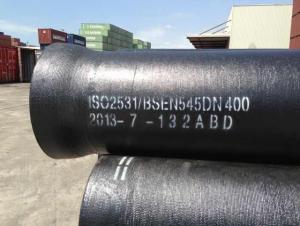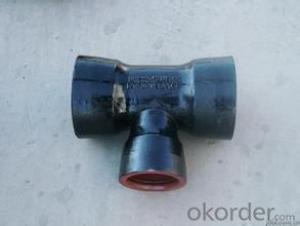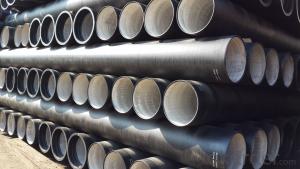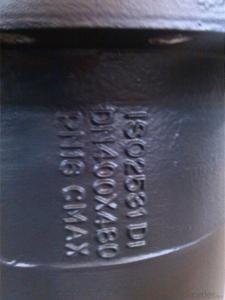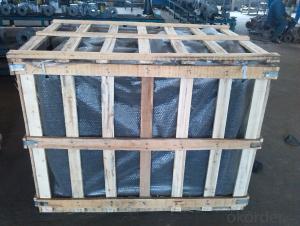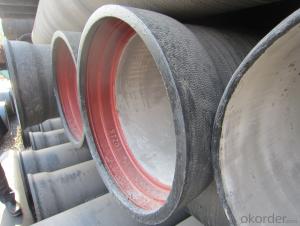DUCTILE IRON PIPE DN1700 C
- Loading Port:
- Tianjin
- Payment Terms:
- TT OR LC
- Min Order Qty:
- -
- Supply Capability:
- 30000Tons m/month
OKorder Service Pledge
OKorder Financial Service
You Might Also Like
CNBM ductile iron pipe ranges from DN80-DN1600mm (T-Type, Class K9), effective length 6m, comply with ISO2531 Standard
Company Profile
CNBM International Corporation is the leading production base and renowned supplier of Ductile Iron Water Pipe systems of both potable and waste water in China. We are constantly looking to develop high quality products to ensure the longest service life and wonderful performance.
CNBM Pipelines regard quality as the essential factor leading to successful business. Every pipe is tested in accordance with BS EN545 (water application) or BS EN598 (sewer application). CNBM Pipelines products comply with and are tested according to the relevant European and International Standards. Our pipes are manufactured under the quality management system BS EN ISO 9001. After years of efforts, CNBM Pipelines has built up great reputation in terms of quality and service among customers worldwide
Product Introduction
CNBM ductile iron pipe ranges from DN80-DN1600mm (Tyton, T-Type, Class K7/K8/K9), effective length: 6m, complying with BS EN545/EN598/ISO2531/BS4772.
Specification& Payment terms
Internal lining: Pipes shall have an internal cement mortar lining in acc with ISO4179.
External coating: Pipes shall be externally coated with metallic zinc spray plus a further layer of resin painting to ISO8179.
Gasket: 100% SBR/NBR/EPDM gasket in accordance with ISO4633.
Packing: Pipes from DN100 to DN300 be bundled with steel belts, the others are in bulk.
Payment term: By 30% T/T advance payment + 70% Irrevocable L/C at sight.
Packing: In bulk vessel or in container.
- Q: How does ductile iron pipe perform in areas with high soil settlement?
- Ductile iron pipe has gained a reputation for its exceptional performance in regions where soil settlement is significant. Thanks to its inherent strength and durability, it remains structurally intact under the pressures exerted by settling soil. The ductile iron pipe's flexible nature enables it to accommodate ground movements caused by soil settlement, thereby reducing the risk of pipe failure or damage. Its adaptability to these movements helps prevent cracks, leaks, and breaks that may occur in more rigid pipe materials. Furthermore, the strong resistance of ductile iron pipe to corrosion provides an additional advantage in areas with high soil settlement. It can withstand the corrosive effects of the soil and other environmental factors, ensuring the pipe system's longevity and reliability. In regions with substantial soil settlement, ductile iron pipe is often the preferred choice due to its ability to handle ground movements without compromising performance. Its strength, flexibility, and corrosion resistance make it an ideal solution for maintaining a robust and efficient water distribution system, even in challenging soil conditions.
- Q: Can ductile iron pipes be used for pressure relief systems?
- Yes, ductile iron pipes can be used for pressure relief systems. Ductile iron pipes are known for their strength, durability, and ability to withstand high pressures. They are commonly used in various applications, including pressure relief systems, where they can effectively handle and dissipate excess pressure to ensure the safety and functionality of the overall system.
- Q: Will the cast iron pipes rust?
- Qualified ductile iron pipes can be used for more than a hundred years. The main place where rust is easily exposed is where the outer wall meets the soil because of its high humidity and high oxygen content. Qualified anticorrosion can effectively resist rust, its process principle can not give you the details. Although the wall has a long flow of water, but oxygen scarce, compared with the outer wall is not easy to corrosion, but there is cement lining is necessary.
- Q: Nodular cast iron, heat treatment process and so on
- High temperature graphitization annealing was adopted to eliminate the chill, and 900-950 and 2-4H obtained ferrite structure
- Q: Are ductile iron pipes suitable for desalination plants?
- Yes, ductile iron pipes are suitable for desalination plants. They possess excellent corrosion resistance and durability, making them ideal for transporting seawater and brine solutions commonly found in desalination processes. Additionally, ductile iron pipes have high tensile strength, allowing them to withstand the high pressure and fluctuating temperatures associated with desalination operations.
- Q: Can ductile iron pipes be used for geothermal heating and cooling systems?
- Yes, ductile iron pipes can be used for geothermal heating and cooling systems. Ductile iron is a strong and durable material that can withstand the high temperatures and pressures associated with geothermal systems. It has excellent corrosion resistance, which is crucial for long-term performance in underground applications such as geothermal systems. Furthermore, ductile iron pipes have high thermal conductivity, allowing for efficient heat transfer in geothermal systems. Overall, ductile iron pipes are a suitable choice for geothermal heating and cooling systems due to their strength, durability, corrosion resistance, and thermal conductivity.
- Q: Are ductile iron pipes suitable for use in agricultural applications?
- Indeed, agricultural applications can benefit from the utilization of ductile iron pipes. Renowned for their remarkable strength and durability, these pipes are well-suited to endure the substantial loads and pressures frequently encountered in agricultural operations. Furthermore, their exceptional resistance to corrosion proves invaluable in agricultural settings where pipes may come into contact with chemicals or fertilizers. Additionally, the long lifespan of ductile iron pipes diminishes the necessity for frequent replacements, thereby minimizing maintenance expenses. In summary, the dependable choice of ductile iron pipes stems from their resilient nature and capacity to meet diverse agricultural demands.
- Q: Can ductile iron pipes be used for underground sewage systems?
- Underground sewage systems can utilize ductile iron pipes, which offer numerous advantages. Ductile iron is a form of cast iron that possesses improved flexibility and strength, making it suitable for a variety of applications, including sewage systems. The first advantage of ductile iron pipes for underground sewage systems is their exceptional resistance to corrosion. This is particularly important in sewage systems where moisture and chemicals can contribute to corrosion over time. By resisting corrosion, these pipes ensure long-term durability and reliability. Additionally, ductile iron pipes possess high tensile strength, enabling them to withstand the pressure and stress that occur in underground sewage systems. They are also capable of withstanding ground movements, such as soil settling or shifting, which can cause damage to pipes made from other materials. Moreover, ductile iron pipes have a smooth internal surface, resulting in improved flow capacity and reducing the likelihood of clogging or blockages in the sewage system. This smooth surface also minimizes the accumulation of debris and sediment, lessening the need for frequent maintenance and cleaning. Another significant aspect is that ductile iron pipes are available in various sizes and can be easily connected using a range of joint systems. This allows for flexibility when designing and constructing underground sewage systems. In conclusion, ductile iron pipes are an excellent choice for underground sewage systems due to their corrosion resistance, high tensile strength, smooth internal surface, and ease of installation.
- Q: What is the expected joint performance of ductile iron pipes?
- The expected joint performance of ductile iron pipes is generally considered to be excellent. Ductile iron pipes are known for their high durability and strength, making them suitable for various applications such as water distribution, sewer systems, and industrial pipelines. One of the key aspects of joint performance in ductile iron pipes is their ability to withstand external loads and pressure. The joints in ductile iron pipes are typically designed to provide a tight and secure connection, ensuring minimal leakage and long-term structural integrity. This is achieved through various joint types, including push-on joints, mechanical joints, and restrained joints. Push-on joints are commonly used in ductile iron pipes and allow for easy installation without the need for special tools or equipment. These joints utilize a rubber gasket that provides a watertight seal, preventing any leakage. Mechanical joints, on the other hand, involve the use of mechanical devices such as bolts and nuts to create a rigid connection between the pipes. This type of joint provides additional strength and resistance against external forces. In terms of performance, ductile iron pipes have been extensively tested and proven to meet or exceed industry standards for pressure and bending strength. They have high resistance to corrosion, which ensures a long service life, and are also less susceptible to damage from ground movements or vibrations. These properties contribute to the overall joint performance of ductile iron pipes, ensuring reliable and efficient operation in various infrastructure systems. Overall, when installed and maintained properly, ductile iron pipes exhibit excellent joint performance, providing a reliable and durable solution for various applications in the water and wastewater industry.
- Q: How are ductile iron pipes connected together?
- Ductile iron pipes are typically connected together using a variety of methods, depending on the specific application and requirements. The most common method of connecting ductile iron pipes is through mechanical joint fittings. These fittings consist of a bell end on one pipe and a spigot end on the other, which are joined together using a rubber gasket and bolts or clamps. The rubber gasket provides a watertight seal, while the bolts or clamps secure the joint and prevent any movement or separation. Another method of connecting ductile iron pipes is through flanged joints. Flanged joints involve attaching a flange to the end of each pipe, which are then bolted together using bolts and nuts. This method is commonly used in larger diameter pipes or in situations where the pipes need to be easily disassembled. In addition to mechanical joint fittings and flanged joints, ductile iron pipes can also be connected using push-on or restrained joint fittings. Push-on joints utilize a rubber gasket that is pushed onto the spigot end of the pipe, creating a secure and watertight connection. Restrained joints, on the other hand, incorporate additional features such as welded-on collars or mechanical devices to prevent movement and provide added strength to the joint. Overall, the method of connecting ductile iron pipes together depends on factors such as pipe diameter, pressure requirements, and the specific application. It is important to follow the manufacturer's guidelines and industry standards to ensure proper installation and reliable performance of the connected pipes.
Send your message to us
DUCTILE IRON PIPE DN1700 C
- Loading Port:
- Tianjin
- Payment Terms:
- TT OR LC
- Min Order Qty:
- -
- Supply Capability:
- 30000Tons m/month
OKorder Service Pledge
OKorder Financial Service
Similar products
Hot products
Hot Searches
Related keywords
